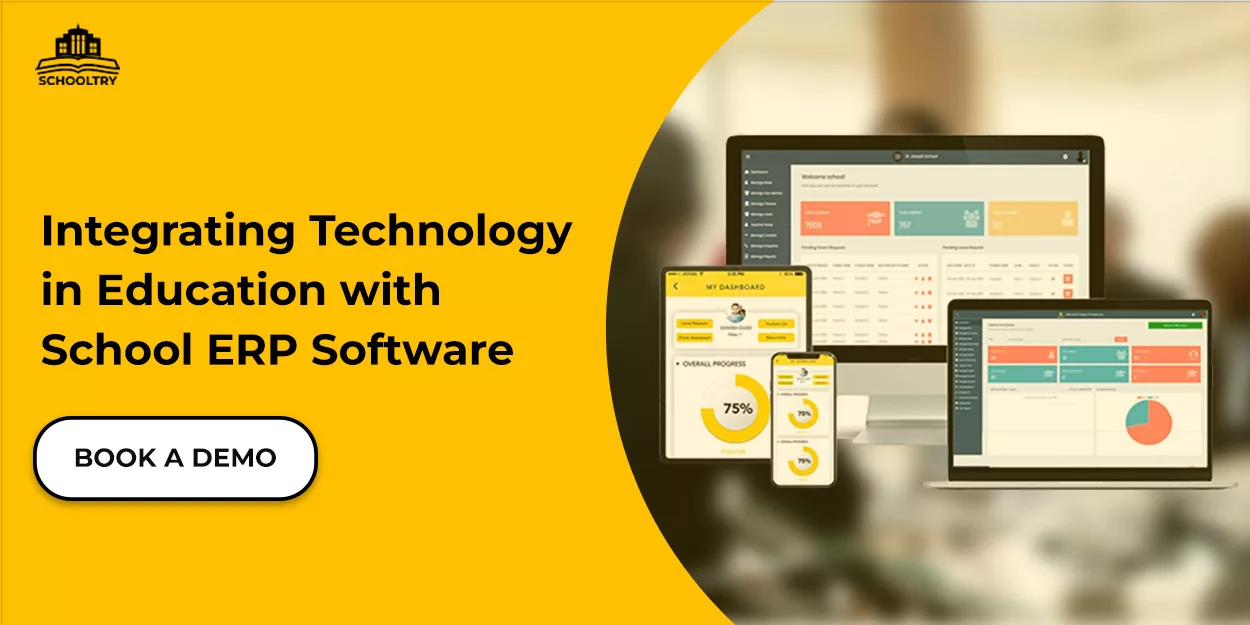Explore the numerous benefits of integrating technology in education through smart mobile and web applications tailored for school management.
Private schools and educators around the world are increasingly turning to school management software to manage school operations and enhance the quality of teaching and learning experiences.
This approach undoubtedly stands as a superior and more convenient method to reduce workload at school, improve communication with stakeholders, and create ample time to address important matters.
To put it simply, school ERPs make it possible for educational institutions to accomplish more tasks in less time, presenting an organized and professional image that leaves parents feeling proud of where their children go to learn.
Today, we’ll explore the numerous benefits of integrating technology into education through smart mobile and web applications tailored for school management.
Benefits of Integrating Technology in Education
01. Improved communication and collaboration
Effective communication is the cornerstone of a successful educational institution. School management software facilitates seamless communication among teachers, students, and parents.
Instant messaging, notification systems, and online portals bridge the communication gap, ensuring that everyone stays well-informed about important events, assignments, and deadlines.
02. Enhanced administrative efficiency
The administrative tasks in schools can be time-consuming and prone to errors when done manually.
School management software automates administrative processes, including attendance tracking, report generation, and timetable scheduling.
This automation not only saves time but also reduces human errors, leading to a more efficient school operation.
03. Personalized learning experiences
Every student is unique, and smart school management software knows this fact. The system allows teachers to customise their teaching methods to individual student needs.
Personalized lesson plans, adaptive assessments, and data-driven insights help students learn at their own pace, improving academic outcomes.
04. Data-driven decision-making
School management software collects and analyzes a vast amount of data.
From student performance to financial records, this data helps schools make informed decisions.
Educators and administrators can identify trends, assess the impact of their strategies, and continuously improve the quality of education.
School Management Software: An Overview
School management software is a comprehensive platform designed to simplify the daily operations of educational institutions.
It includes features like student information management, attendance tracking, grading systems, and financial management tools.
User-friendliness is crucial in such software, as educators and administrators should be able to navigate it without extensive training.
How School Management Software Enhances Education
01. Streamlining administrative tasks
Tasks like managing student records, generating report cards, and scheduling classes are automated, reducing the administrative burden on teachers and staff. This allows educators to allocate more time to teaching and interacting with students.
02. Tracking student progress and performance
School management software provides real-time access to student performance data. Teachers can monitor progress, identify struggling students, and provide timely interventions to help them succeed.
This personalized approach is invaluable in promoting academic excellence.
03. Enhancing parent-teacher communication
Parents can stay actively engaged in their children’s education through online portals and communication tools within the software.
They receive updates on their child’s academic performance, attendance, and school events, fostering a strong home-school partnership.
04. Promoting a paperless environment
The software encourages a shift towards a paperless environment, reducing the environmental impact of schools.
Digital assignment submissions, electronic communication, and online resources are just a few examples of how schools can contribute to sustainability.
Challenges and considerations
Despite the numerous advantages, there are challenges in adopting school management software, including:
- Data security and privacy concerns: Schools must ensure that sensitive student and administrative data is securely protected to avoid potential breaches.
- Training and adoption hurdles: Proper training is essential for educators and staff to fully leverage the capabilities of the software.
- Cost and budget considerations: Implementing school management software may require a significant initial investment. Schools should carefully consider the financial implications.
School management software future trends at a glance
The future of school management software is exciting, with emerging technologies like artificial intelligence, virtual reality, and cloud-based systems.
These technologies have the potential to further improve education, providing even more opportunities for personalized learning and streamlined school operations.
Wrapping Up
Integrating technology into education through school ERP software is a transformative step towards a brighter and more efficient future for schools.
Besides, the benefits of improved communication, enhanced efficiency, and personalized learning experiences are only too valuable to ignore.
And even though we’ve seen that challenges do exist, you can easily overcome them with careful planning and commitment.
Sign up for SchoolTry and experience what smart school management looks like, and bring the classroom home to students who couldn’t attend, among other things. Use this simple form to register and start your free 3 months trial period.
